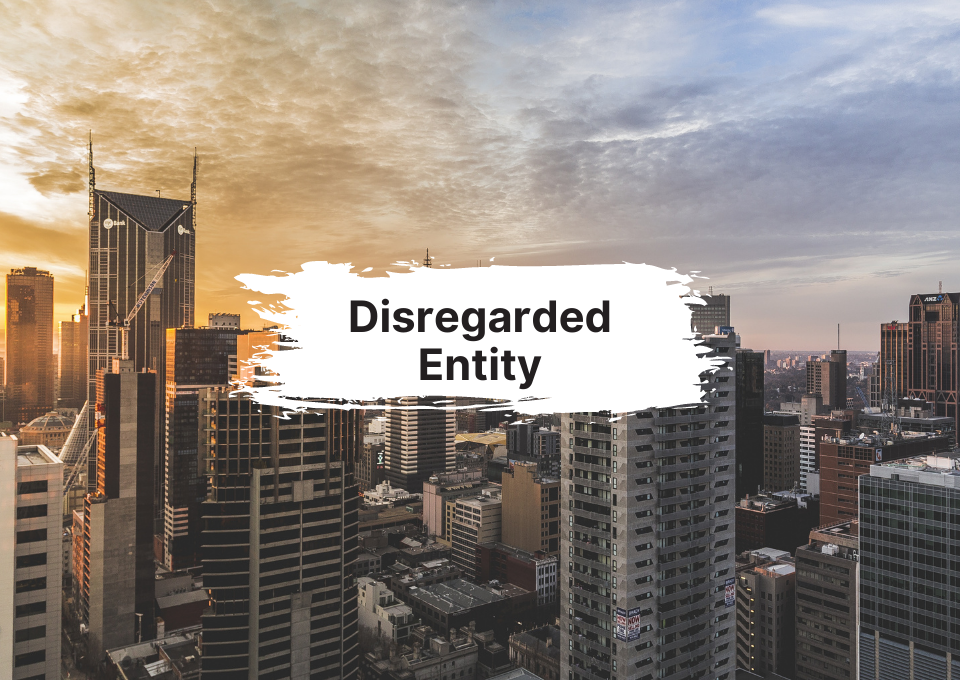Are you the sole owner of your business?
Do you know about the owner’s income tax return filing?
How is the term “disregarded entity” connected to all this?
How does the Internal Revenue Service (IRS) tax businesses with a single owner?
Read and learn more about the concept of a disregarded entity:
What is a Disregarded Entity?
When you establish a business or a company, one of the most essential decisions you'll make about it will be the framework of your business/ company. When it comes to submitting the taxes for your small company, this has an influence on the scope of your legal protections and the magnitude of your tax bill payments.
A disregarded entity is a form of business entity that provides special benefits for reducing the amount of company taxes owed to the Internal Revenue Service (IRS). Disregarded entity owners just pay personal taxes on their business revenue and do not have to worry about corporation taxes. A disregarded entity also lowers a company owner's legal risks.
A single-member limited liability company ("SMLLC"), for instance, is considered as a disregarded entity. The only member of an SMLLC disregards the independent legal status of the SMLLC otherwise in effect under state law for federal and state tax reasons.
The SMLLC does not submit a separate tax return as a result of being "disregarded." Rather, the income and loss are recorded on the single member's tax return:
- The revenue and loss of the SMLLC are reported on the sole owner's Form 1040, U.S. Individual Income Tax Return if he or she is an individual. This procedure is analogous to starting a business as a lone proprietor.
- The SMLLC's income or loss is recorded on the corporation's Form 1120, U.S. Corporation Income Tax Return (or Form 1120S in the case of an S Corporation) if the proprietor is a corporation. This is analogous to the treatment given to a business branch or division.
An SMLLC isn't the only entity that is handled as if it doesn't exist. A qualified sub-chapter S subsidiary and a qualified Real Estate Investment Trust (REIT) subsidiary are also not taken into account. SMLLCs, on the other hand, are by far the most commonly overlooked entity currently in use.
The SMLLC does not exist for federal taxation purposes. The purchasing corporation assumes ownership of all of its assets and obligations.
Even while the tax status of a disregarded company is obvious for federal tax reasons, it is not for state law ones. An SMLLC's owner, for example, is not personally accountable for the entity's debts and liabilities. The owner, however, is normally classified as the employer of disregarded entity workers for employment tax reasons because the entity is ignored.
Learn more about what business types come under disregarded entities, their tax considerations, how a disregarded entity works, and the pros & cons of disregarded entities.
Which Business Types Come Under Disregarded Entity?
There is only one kind of company. When you create a single-member LLC, you become a disregarded entity by default.
Don't be terrified by the word "default." You can request to modify your categorization without altering your legal structure because a disregarded entity is only a tax classification, not an actual business entity structure.
When filling out paperwork for the IRS, such as an application for an Employer Identification Number, you may come across these words.
What About Sole Proprietors, Though?
Despite the fact that sole proprietors' company revenues are carried through to their personal tax returns, they are not considered disregarded entities since they do not register as a distinct entity with their state.
And What About Multi-Member LLCs?
The IRS does not recognise multi-member LLCs as taxable entities, although their default tax categorization is a partnership, not a disregarded entity.
While the IRS does not recognise any type of LLC as a taxable company, it does differentiate between single-member and multi-member tax categories.
How Are Disregarded Entities Taxed?
Disregarded entities are entitled to the same taxation as sole proprietorships.
If you're a single-member LLC that hasn't altered its tax classification since it was formed, you're paying taxes like a sole proprietor.
Sole proprietors are taxed on their taxable company income as pass-through companies. After subtracting your tax deductions from your overall income, you'll have taxable earnings.
Disregarded entities (and sole proprietors) must pay two taxes:
- The 15.3%, self-employment tax
- Income tax, which is calculated according to your tax bracket
As a disregarded entity, you record your complete company revenue, costs, and profits on Schedule C, which you submit with your Form 1040: U.S. Individual Income Tax Return. Line 12 of Schedule 1: Additional Income and Adjustments to Income is filled in with information from Schedule C. Your 1040 tax return will then include this information.
Even if you don't use the revenues from your firm for yourself, you'll still be taxed on the entire profits since they're "passed through" to you, the owner.
Tax Considerations for a Disregarded Entity
- Flow-Through Taxation: The IRS will disregard the entity status of your LLC. This implies that your LLC's profits won't be taxed at the corporate level; instead, they'll flow through to you, and you'll be responsible for accounting for them on your personal tax return
- Self-Employment Tax: You must pay self-employment tax as a single-member LLC. Your full net income will be subject to Social Security and Medicare taxes. This equates to around 15% of your net profits, albeit you can deduct 50% of your self-employment tax
- Payroll and Excise Taxes: When it comes to payroll and excise taxes, the IRS sees your firm as a separate entity. This implies that if you hire workers or deal with excisable items, you'll need to get an employer identification number (EIN) for your LLC and use it to record and pay employment and excise taxes
- Changing Tax Status: While a single-member LLC default tax status is that of a disregarded company, you can choose to alter it to that of a corporation—even if your business structure remains the same. For certain single-member LLC business owners, this may be useful. If you add LLC members, your tax status will shift from sole proprietorship to partnership
Working of a Disregarded Entity
There are various kinds of disregarded entities, but the single-member LLC is the most common one that small company owners should be aware of. This is a business entity option accessible to sole proprietorships. To create a single-member LLC, you must file company formation papers with your state, just like any other registered business entity.
After you've filed your LLC formation paperwork, you'll need to select how your LLC will be taxed. If your LLC includes several owners, the IRS will tax your firm as a partnership by default unless you decide to have it taxed as a corporation (which you can do by filing IRS Form 8832). If your LLC has only one owner, the IRS will tax it as a disregarded entity by default unless you want to have it treated as a corporation.
Companies operating in the United States, as well as those based elsewhere, might opt to establish themselves as disregarded entities. For tax purposes, a foreign disregarded entity is classified as a foreign branch of a U.S. business. All of the business's income would go through to the owner's personal income tax return, just as it would with a domestic disregarded company. The foreign firm does not have to record its income separately, making tax filing for international enterprises easier.
Pros & Cons of Disregarded Entities
Pros
- Simple tax filing
- No double taxation
- Limited liability protection
Simple tax filing
The convenience with which you may submit taxes is the primary benefit of forming your LLC as a disregarded business. If your LLC is a disregarded company, all of its revenue and costs will be reported on Schedule C of your personal tax return, just like a single proprietor's business income and expenses.
The income from the business will be taxed at your personal income tax rate. As a result of the Trump tax plan going into effect, disregarded entities will be allowed to claim a 20% deduction on business revenue before submitting their return starting in the 2019 tax season.
No double taxation
By electing to be taxed as a disregarded entity, a single-member LLC can save costs by eliminating double taxes. C-corporations are frequently subjected to double taxes. C-corporation shareholders pay taxes once under the corporate income tax rate, which is a flat 21% in 2019.
Furthermore, dividends are subject to personal taxation for shareholders. You only pay taxes once at the personal level with a disregarded entity, possibly saving your firm thousands of dollars.
Limited liability protection
The limited liability protection provided by a disregarded corporation is another benefit. If your LLC is sued, the claimant can only recover from the assets of your company. They are unable to seize your personal property, such as your home or bank accounts. Owners of sole proprietorships and partnerships, on the other hand, risk losing their personal assets in the event of a company disagreement.
A significant disclaimer should be mentioned here. Courts have "pierced the veil" of single-member disregarded entity LLCs, holding the owner personally accountable for the business's actions. The simplest way to avoid this is to comply with all of your state's requirements for LLCs.
You should also have an operating agreement for your LLC and a separate company bank account for commercial activities. This demonstrates to the legal system that your business is different from the owner, even if it is "disregarded" for tax reasons.
Cons
A disregarded entity, in many respects, is the ideal "sweet spot" for a small business owner: you may save money on taxes while still protecting your personal assets from prosecution. However, there are several disadvantages to operating as a single-member LLC disregarded entity, like:
- Difficult to raise money
- Responsible for various other taxes
Difficult to raise money
The most significant downside is that as a disregarded entity, it is more difficult to attract funds from investors. The majority of investors choose to put their money into C-corporations. C-corporations can issue a variety of stock classes, which investors can easily purchase to claim ownership of the firm or sell to unload their ownership.
Responsible for various other taxes
The other disadvantage of a disregarded entity is that your LLC must still pay self-employment taxes, payroll taxes, and excise taxes, as we'll go over in more depth below (if applicable to your type of business). These costs are in addition to your income taxes, and they can dramatically increase your tax liability.
A C-owners, corporation's on the other hand, do not have to pay self-employment taxes. They also have the option of structuring payments as a dividend to avoid payroll taxes (though that will be subject to the dividend tax rate).
How to Become a Disregarded Entity?
The best part is that if you decide that a disregarded entity tax status is the safest bet for your single-member LLC, you won't have to do anything more.
Because the IRS's default single-member LLC tax status is a disregarded entity, you must make an election solely if you do not want your firm to be a disregarded entity.
Fill out Form 2553 to have the IRS treat your company as a corporation. The election must be made no later than 2 months and 15 days after the start of the tax year in which it will be implemented.
Final Words
If you run a single-member LLC, being classified as a disregarded entity can help you save money on taxes and safeguard your personal assets from liabilities.
If you've already completed the paperwork to form an LLC and there are no other members, there's nothing further you need to do. If you're a sole proprietor and wish to become a disregarded entity, though, you'll need to become an LLC (and have no other partners in the business). For instructions, go to the Secretary of State's website in your state.
All you need to do is to keep detailed records of your company's earnings and the money you take out in draws as the owner. This will come in handy when it comes time to file your personal tax return. Any money you withdraw for personal use from your company account is a reportable transaction that must be recorded as income.
How can Deskera Help You?
Deskera Books can help you automate your accounting and mitigate your business risks. Creating invoices becomes easier with Deskera, which automates a lot of other procedures, reducing your team's administrative workload.

Learn about the exceptional and all-in-one software here:
Key Takeaways
- A disregarded entity is a form of business entity that provides special benefits for reducing the amount of company taxes owed to the Internal Revenue Service (IRS)
- A single-member limited liability company ("SMLLC") is considered a disregarded entity
- When you create a single-member LLC, you become a disregarded entity by default
- Sole proprietors are taxed on their taxable company income as pass-through companies. Similarly, the disregarded entities are taxed
- To become a disregarded entity for your single-member LLC, you don't have to do anything extra. This is because the IRS’s default single-member LLC tax status is a disregarded entity
- Keep detailed records of all your professional and personal transactions for easy tax payments
Related Articles











